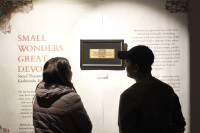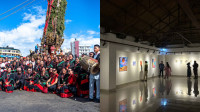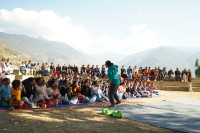Culture & Lifestyle
With movement restricted, priests take to virtual means to conduct rituals
In such unprecedented times, some priests have gotten creative with worship: they are streaming services for the religious remotely.
Shashwat Pant
“My children use Zoom to study, and I thought why not use it for my work as well,” says the 53-year-old, who has been using Zoom, a video conferencing app, to conduct rituals amidst the lockdown. “I’d done something similar for my clients in the US, but I had never thought I would be doing it in Nepal. I guess this is the new normal now.”
For Thapaliya, the months of April, May and June would have been busy. He would have been conducting weddings, pasnis, and other cultural events, including shraddhas. But due to the lockdown, many people have either postponed or cancelled such ceremonies, and priests like Thapaliya have been stuck at home. But there are others who can’t do without carrying out such rituals, and for them, priests like Thapaliya have become a godsend.
“I have been doing rituals online a few times earlier too, for Nepalis abroad. But many Nepalis here are very traditional and not used to this medium, yet they call me for they have no other choice right now,” he says.
Ramesh Hamal, from Dhangadi, became a father during the lockdown. Even though Hamal understood that having an event like a nwaran or a pasni would be insensitive during the lockdown, his parents insisted that they have one.
“It’s tough to argue with your elders. They just don’t want to see things rationally,” Hamal said. “Because of my parents’ insistence, I asked a priest in Kathmandu to conduct my son’s nwaran via a Facebook video call. Even though my parents didn’t support the idea of doing the ceremony virtually fully, they were glad that we at least held it.”
For much of the older population in Nepal, conducting religious rituals is extremely important. Many Hindus believe that for any auspicious event to take place, it is important that a priest steps foot into the house and recites prayers. Thapaliya says that many believe a house that does not host rituals or host a brahmin who recites verses from the vedas is considered impure.
“What Ramesh has done is nice. But it seems to me he’s done it for us. So that we don’t become unhappy,” says Sita, Ramesh’s mother. “But doing these rituals just for the sake of it is wrong.”
Archarya Bala Ram Khakurel, a Hindu priest based in Bal Kumari, Lalitpur, says he has been conducting online rituals for almost a decade now. Since he started doing it, in the early 2010s, he’s done around 50 rituals via the use of Skype, Viber and Facebook. But Khakurel, like Thapaliya, says he never thought that he would be carrying out rituals virtually in Nepal.
“I've been doing this for people in Australia, America and New Zealand. And I don’t feel awkward, yet, doing it for Nepalis here feels strange somehow,” says Khakurel. Besides holding online rituals, Khakurel also makes birth charts for people abroad. But since the lockdown, many of the orders are from Nepal itself.
“Even in the pandemic, people are getting married. They are giving birth. Such things haven’t stopped. I haven’t conducted any ceremony yet, but I’ve prepared a few birth charts and sent it to my clients via Facebook and Viber,” says Khakurel. For his services, Khakurel says his clients send his payment via Moneygram, a global money transfer company, while the ones in Nepal transfer it to his bank account.
But not everyone is happy about mixing religion with technology.
Ghanshyam Acharya, 67, has worked as a priest for nearly 40 years. He, like Thapaliya, would have been very busy during these months. And as Acharya isn’t technologically adept, he hasn’t been getting any jobs.
“I don’t own a smartphone. Even if I did, I wouldn’t be doing rituals online,” says Acharya. “It’s not right to do it that way. While many of my colleagues might disagree with me, I think we might be on the verge of losing our culture and our way of doing things.”
Acharya says not everyone has been getting online ritual offers and adds that what he misses more than his fees is being present with his clients and seeing the happiness in their eyes while they are doing the rituals.
“Money was secondary. The entire process and the connection we feel with the people is what I miss the most,” he says. “I hope this pandemic will get over soon, because I miss visiting temples and conversing with people. It was a part of my life and right now, that life is a distant memory.”




 10.11°C Kathmandu
10.11°C Kathmandu















